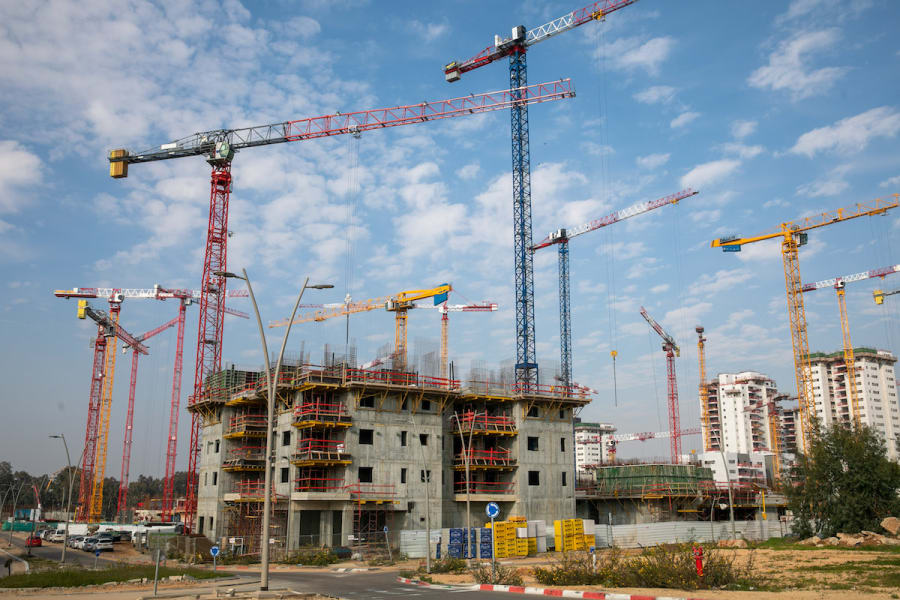Israel to meet acute labor shortage with Moroccan workers in construction, caregiving
New labor agreement, which will benefit both nations, is a result of Abraham Accords

Israel has turned to Morocco to find the tens of thousands of people it needs for construction jobs and care for the elderly.
During a visit to Morocco last week, Israel’s Interior Minister Ayelet Shaked announced the launch of a pilot project that will bring thousands of Moroccan professionals into the Israeli workforce.
Israel is “lacking about 40,000 workers, in 10 different professions,” said Yitzhak Moyal, chairman of the Construction and Wood Workers Union within Israel’s Histradrut labor federation.
Of the workers Israel needs, half are home-based caregivers.
The labor accord with Morocco lands on the end of a three-week strike for Israel’s nursing bureaus, which are responsible for absorbing foreign workers into Israel’s home nursing industry.
Israel presently employs about 60,000 foreign caregivers, predominantly from East Asia, and about 100,000 foreign construction workers, predominantly from China and Thailand, in addition to Arabs from the West Bank, who work in the sector.
“We are certain that this cooperation with the Moroccans will help us advance the housing market and also support the elderly population in Israel,” Shaked said on Monday before her flight to Morocco.
Shaked signed the labor agreement with Moroccan Foreign Minister Nasser Bourita. She also met with her Moroccan counterpart, Abdelouafi Laftit, Minister of Economy and Finance Nadia Fettah Alaoui and other top officials.
Moyal told Israeli media that Israel’s minimum wage for construction workers is almost twice as much as Morocco’s average $11,400 per year for the same profession.
“We’re hoping to receive about 15,000 Moroccan construction workers, in a few batches. This could really improve the pace of construction in Israel,” Moyal said, noting that the workers could begin to arrive in Israel as early as Jan. 2023.
The formal diplomatic agreement between Israel and Morocco in Dec. 2020, mediated by former U.S. President Donald Trump during the development of the Abraham Accords, was more or less the starting point for the labor agreement between the two nations.
“After the peace agreement was signed, the Moroccan government started talking to us,” Moyal said. “We learned that Morocco has a massive number of professional workers, and we figured out how we can make this work.”
Shaked is the third Israeli minister to make an official visit to Morocco since the Abraham Accords. Minister of Economy and Industry Orna Barbivay visited this February; and Minister of Innovation, Science and Technology Orit Farkash-Hacohen visited in May.
ISRAEL’S POSITION ON THE WESTERN SAHARA
While there, Shaked publicly reaffirmed Israel’s support for Morocco’s claim of sovereignty over the disputed Western Sahara, which was a condition for Morocco’s formal forging of ties with Israel in December 2020.
In March, Israeli Foreign Minister and alternate-Prime Minister Yair Lapid also expressed Israel’s endorsement of the Moroccan position, after hosting Morocco’s foreign minister at the Negev Summit.
“We are determined to bring prosperity and peace to this region and beyond,” Lapid said at the time.
“In this context, Spain’s statement … in support of Morocco’s autonomy plan for the Western Sahara, a plan others have also already endorsed, is a positive development,” he said.
Morocco’s autonomy plan, submitted to the United Nations in 2006, advocates autonomy, but not independence, for Western Sahara – maintaining Moroccan sovereignty.
Western Sahara, on the northwest coast of Africa, was a Spanish colony until 1975. Morocco occupies 80% of the territory, while the remaining 20% is controlled by the Algeria-backed Polisario Front.
The Polisario Front allegedly represents the Sahrawi people and fights for self-determination and independence in all of Western Sahara.
As part of the Abraham Accords, Trump recognized Morocco’s sovereignty over Western Sahara in exchange for Morocco formally normalizing relations with Israel. In February 2021, however, 25 senators urged U.S. President Joe Biden to reverse the decision, arguing that it had been “misguided.”
“The abrupt decision by the previous administration on Dec. 11, 2020, to officially recognize the Kingdom of Morocco’s illegitimate claims of sovereignty over Western Sahara was short-sighted, undermined decades of consistent U.S. policy, and alienated a significant number of African nations,” the senators wrote in their letter to Biden.
“We respectfully urge you to reverse this misguided decision and recommit the United States to the pursuit of a referendum on self-determination for the Sahrawi people of Western Sahara,” they stated. “The United States owes it to the Sahrawi people to honor our commitment, to help ensure the Moroccans live up to theirs, and to see this referendum through. The Sahrawi people deserve the right to freely choose their own destiny. We hope that we can count on you to be a partner in this effort.”

The All Israel News Staff is a team of journalists in Israel.














